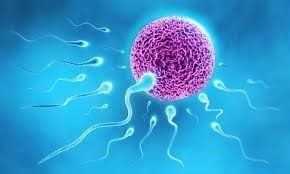MALE INFERTILITY
Male Infertility
Male infertility is described as 'a male's inability to cause pregnancy in a fertile female'.
Male infertility is shown to account for 35–40% (or 1/3rd) of couple's infertility. It is estimated that approximately 1 in 20 men has low sperm count while 1 in 100 men has no sperm in his ejaculate.
Symptoms of male infertility
In many cases of male infertility, there are no obvious signs of infertility! Intercourse, erections and ejaculation tend to happen without difficulty and the quantity and appearance of the ejaculated semen generally appears normal to the naked eye. This means that medical tests would be needed to find out whether or not a man is infertile.

CAUSES OF MALE INFERTILITY
In relation to male infertility, it is grouped into
- known causes of male infertility
- associated factors to male infertility
A) Known causes of male infertility
1. Sperm production problems
- Chromosomal or genetic causes
- Undescended testes (failure of the testes to descend at birth)
- Infections
- Torsion (twisting of the testis in scrotum)
- Varicocele (varicose veins of the testes)
- Medicines and chemicals
- Radiation damage
- Unknown cause
2. Blockage of sperm transport
- Infections
- Prostate-related problems
- Absence of vas deferens
- Vasectomy (surgically cutting and sealing a part of each vas deferens)
3. Sexual problems (erection and ejaculation problems)
- Retrograde and premature ejaculation
- Failure of ejaculation
- Erectile dysfunction
- Infrequent intercourse
- Spinal cord injury
- Prostate surgery
- Damage to nerves
- Some medicines
4. Hormonal problems
- Pituitary tumours
- Congenital lack of LH/FSH (pituitary problem from birth)
- Anabolic (androgenic) steroid abuse
5. Sperm antibodies
- Vasectomy
- Injury or infection in the epididymis
- Unknown cause

B) Associated Factors for Male Infertility
1. Age and Infertility
While you can not control your age or the age of your partner, you can discuss and plan your family sooner than later. Age is one of the major factors that have inverse relationship with male and female fertility. This means that the older a man grows (40 yrs and above), the lower the quality of the man’s sperm becomes and consequently the longer it may take for his partner to get pregnant and the higher the risk of her not conceiving at all.
Studies have shown that whatever the age of the woman, the risk of a woman having miscarriage is higher if the partner is over 45. Other studies also noted that the children of older fathers are at greater risk of autism, mental health problems and learning difficulties.
The figures about men, age and fertility
- The average time to pregnancy if a man is under 25 is just over 4.5 months but nearly two years if a man is over 40 (and the woman is under 25).
- There is a 5 X increase in time to pregnancy if the male partner is aged over 45 years.
- For couples having IVF, the risk of not having a baby
is more than five times higher if the male partner is aged 41 or older.
- The volume of a man’s semen and sperm motility (the ability of sperm to move towards an egg) decrease continually between the ages of 20 and 80.
- The risk of miscarriage is twice as high for women whose male partner is aged over 45 than for those whose partners are under 25.
- Children with fathers aged 40 or older are more than five times as likely to have an autism spectrum disorder than children fathered by men aged under 30.
2. Weight
A. Being overweight
Excess weight can significantly affect a man’s fertility. Overweight and obesity in males is associated with:
- lower testosterone
- impaired or poor sperm quality,
- higher rate of erectile dysfunction (ED).
B. Being underweight
Being underweight can also reduce a man’s sperm quality, consequently reduce his fertility. A BMI under 18.5 is classified as ‘underweight’.
3. Smoking
Smoking is shown to cause erectile dysfunction. Smoking in the three months before conception can damage the DNA in sperms thereby affecting the health of the child conceived from such damaged sperm. Smoking by the father or both parents around the time of conception is also documented as a risk factor for childhood leukaemia. Though smoking has been shown to cause erectile dysfunction and sperm damage, sperm takes three months to develop. This means that the most important time for men to improve their health and quit smoking is in the three months leading up to conception.
Stopping smoking can improve natural fertility and some of the effects of smoking can be reversed within a year of quitting.
4. Alcohol
Though the mechanisms through which alcohol impairs fertility are unclear, It has been shown to be associated with reduce libido and poor sperm quality in men. It is therefore advisable for the aspiring couples to reduce, if not abstain from alcohol during the period of attempting to conceive
5. Heat
It is established that raised body temperature, particularly the temperature around the testes, can reduce sperm production. For this reason, men should avoid long exposure to hot baths, spas and saunas and long sitting with their laptops or electronic devises on their lap.
6. Drugs
The use of the following drugs should be avoided when planning a pregnancy.
a) Anabolic steroids: These are often taken for body building or competitive sports. It has been shown to cause reduction in male's testicular size and can reduce or sperm production. They can also affect the testosterone levels.
b) Recreational drugs,
including cocaine, heroin, and ecstasy have also been shown to affect male fertility. Some studies suggested that many of the recreational drugs can lower a man’s sperm count, decrease seminal volume, reduce sperm motility (movement ability),lower testosterone levels and sex drive. consequently affect fertility.
7. Sports and recreation injury
Cycling and fertility
For most men, riding a bike is unlikely to cause any fertility issues. An active lifestyle is important to good health and fertility. However, if you’re a serious long-distance cyclist, or triathlete, evidence suggests that prolonged time in the saddle may affect fertility. This may be due to irritation and compression caused by friction of the testes against the saddle, or tight lycra, which raises the temperature around the testes and can decrease blood flow to the genitals.
It may therefore be worth-the-while to
- invest in a good saddle and padded shorts
- take regular breaks from the saddle.
8. Sexually transmitted infections (STIs)
Sexually transmitted infections (STIs), particularly gonorrhoea and chlamydia, can affect the fertility of both women and men.
a) Chlamydia
Chlamydia is one of the most common bacterial infection resulting from unprotected sex. It is estimated that about 75% of women and 25% of men will be asymptomatic (no symptoms). Those that have symptoms are likely to ignore it because chlamydia often present in similar way as other conditions such as thrush and cystitis. The following are common presentations:
- discharge from the penis
- burning or pain when urinating
- itching or irritation around the opening of the penis
- pain or soreness in the testicles.
- Chlamydia causes inflammation of the urethra. If left untreated, can progress to the epididymis (the tubes which carry sperm). This can cause pain, scarring, and sometimes fertility problems.
b) Gonorrhoea
Gonorrhoea is a bacterial infection that usually affects the genital area, though other areas may be affected. Common symptoms for men are:
- a burning sensation while urinating
- a white or yellow pus-like discharge from the penis
- swelling and pain in the testicles, which can occur if the gonorrhoea infection goes untreated.
- In a small percentage of men there are no symptoms at all.
9. Environmental toxins
Scientists have begun to investigate the effects that certain chemicals have upon our overall health. Research has established that some chemicals in the environment can affect reproductive health. An environmental toxin, scientifically known as an endocrine disruptor, is a chemical that interferes with the hormones within our body. Both male and female bodies are affected by these toxins and research suggests that the toxins can affect many areas of our fertility.
The list of harmful chemicals:
- BPA (bisphenol-A),
- PCB (polychlorinated biphenyls),
- phthalates and
- DDT
10. Cancer treatment
Cancer treatment can affect a person’s fertility. It is important that the couples enquire about fertility options (e.g. eggs or sperm freezing) available before commencing the cancer treatment




